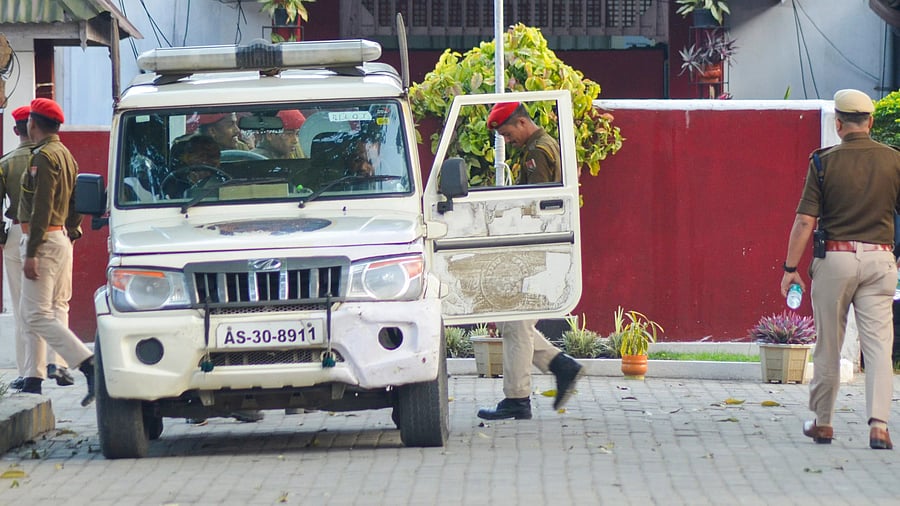
Assam police personnel. Image for representational purpose
Credit: PTI Photo
Guwahati: The Guwahati Police, in its FIR against journalists Siddharth Vardarajan and Karan Thapar, also names former Jammu and Kashmir governor Satya Pal Malik, who has since died, Pakistani media personality Najam Sethi and Indian media person Ashutosh Bharadwaj, along with "unknown persons".
The FIR, filed on May 9, by Guwahati resident Biju Verma alleged that in the aftermath of the Pahalgam terror attack and Operation Sindoor, online news platform 'The Wire' and some of its authors and editors published a series of articles and commentaries (between late April and early May 2025) that "prima facie undermine India's sovereignty and security, promote enmity and public disorder, and spread misinformation".
The police had issued summons to Vardarajan and Thapar in connection with this case last week, directing them to appear before the Crime Branch on August 22, but the Supreme Court on Friday gave them protection against "coercive action" by the police.
The Supreme Court had also granted protection to the two journalists earlier in a case filed by the Morigaon Police.
The case was registered under Sections 152 (sedition), 196, 197(1)(D)/3(6), 353, 45 and 61 of the BNS, 2023.
Guwahati Police on Thursday registered an FIR against another journalist, Abhisar Sharma, who has said that he will respond legally.
The complainant alleged that the featuring of Najam Sethi of Pakistan adds an "international dimension that risks projecting India's constitutional democracy as oppressive, while potentially lending intellectual validation to narratives peddled by hostile regimes".
"When such interviews are timed immediately after a terror attack and are broadcast widely to a domestic and global audience, they cannot be seen as mere dissent; they risk becoming instruments of misinformation, sedition, and national destabilisation under the cloak of journalism," he said.
The complainant alleged that Karan Thapar had hosted a series of interviews on 'The Wire' with individuals such as Najam Sethi, Ashutosh Bharadwaj, and former Jammu and Kashmir governor Satya Pal Malik (who died on August 5) wherein "grave and offensive remarks have been made against the Government of India, particularly in the aftermath of the Pahalgam terror attack".
"These interviews go beyond journalistic scrutiny and appear to provide a platform for unverified, inflammatory, and politically charged statements that directly or indirectly assign blame to the Indian state for acts of terrorism perpetrated by cross-border elements," he alleged.
Particularly alarming is the repeated use of these interviews to suggest complicity, negligence, or even orchestration by Indian authorities, an insinuation that plays directly into the hands of enemy propaganda and sows distrust among the citizenry, the complainant claimed.
The complainant mentioned a list of articles that have portrayed the Indian state as "entirely ineffective and by glorifying Pakistani terrorists as smarter than us", stating that the content "recklessly erodes public confidence in national security institutions and undermines the morale of our armed forces".
An article belittled the constitutional office of the Prime Minister and also maligns the response mechanisms of the Indian state in the face of terrorism, thereby weakening public trust in the government's ability to protect its citizens, he said.
By framing the Pahalgam terror attack as a failure of India's sovereign policies and echoing enemy narratives, the article dangerously shifts blame from Pakistan-sponsored terrorism to domestic governance, the complainant said.
The publication of five articles by 'The Wire' in the immediate aftermath of the Pahalgam terror attack, 'To War or Not to War', 'Over-Propaganda', 'After Operation Sindoor', 'Bludgeoning Kashmir Is Not the Answer', and 'IAF Rafale Downed by Pakistan', systematically "erode the credibility of India's armed forces, question the legitimacy of its sovereign responses, amplify hostile narratives without verification, and insidiously equate counter-terror operations with communal or electoral motives".
"At a time when national cohesion is paramount, such publications not only compromise public confidence and operational secrecy but also risk provoking unrest, endangering lives, and undermining India's international standing," he stated.
Freedom of expression does not extend to the deliberate corrosion of constitutional institutions during national emergencies, and such conduct may well fall within the threshold of offences against the state under both penal and constitutional jurisprudence, he said.
Freedom of expression is also not a license for the intellectual legitimisation of enemy objectives or internal destabilisation, particularly when the nation is bleeding, he added.
These cannot be excused as journalism in the public interest; they are designed narratives aimed at undermining India's unity, stoking communal disharmony, and weakening institutional trust during a national crisis, the complainant stated.
"Such conduct warrants strict constitutional scrutiny and, where appropriate, invocation of the penal framework to safeguard the sovereignty and integrity of the Republic," he said.
A case must be registered given the grave implications of the above publications in provoking unrest, undermining national security, and spreading narratives aligned with hostile interests, he added.